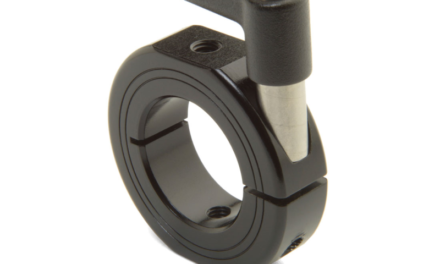 At its plant in Liverpool, Dibro decorates glass containers by applying painted finishes, acid-etched effects and lacquers, and has recently installed a printing facility for ceramic and precious metal printing. When the company decided to automate a glass treatment process where the bottles would be sprayed with a slip coating after printing as they emerge on a conveyor from the firing lehr, it turned to HepcoMotion.
At its plant in Liverpool, Dibro decorates glass containers by applying painted finishes, acid-etched effects and lacquers, and has recently installed a printing facility for ceramic and precious metal printing. When the company decided to automate a glass treatment process where the bottles would be sprayed with a slip coating after printing as they emerge on a conveyor from the firing lehr, it turned to HepcoMotion.
A linear system was required to transport a spray nozzle mechanism across the full width of the conveyor, coating a line of bottles on each pass.
HepcoMotion suggested a complete system based on a hybrid version of its Profile Driven Unit, the PDU2; a bespoke solution from its standard range of products. The system needed to provide consistent speed of the traverse unit to ensure an even spray coating and also the accurate positioning of the spray head so only the sides of the bottles are coated.
The PDU2 is a compact belt-driven linear actuator which, due to its Herculane wheels, runs virtually friction-free on the inside of the profile. This provides extremely stable support for the carriage plate that carries the spray nozzle. Felt wipers sweep away any debris in its path.
The system comprises a rigid but lightweight aluminium slotted profile into which fits the toothed belt drive and carriage, an arrangement that effectively encloses the unit and makes it suitable for operating in the damp conditions on the bottle production line.
The system cycle is dictated by the belt speed of the lehr which in turn is dependent on the size of the bottles being printed. Typically the traverse unit operates every minute, travelling at around 200mm/sec. The lehr is 2m wide so it typically takes the system ten seconds to coat 15 one-litre spirit bottles or 50 perfume bottles.

